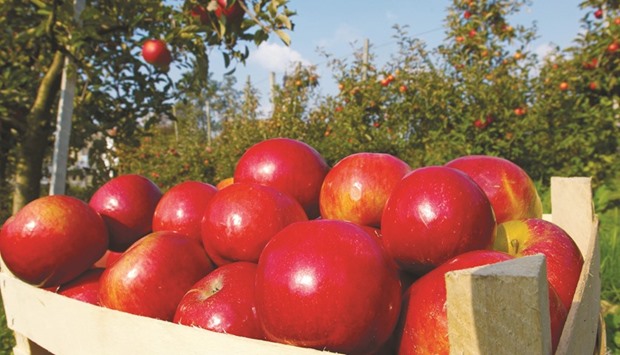It’s not everyday I find a box ... a big box ... of fresh apples on my front porch. In the middle of winter, no less. It was from a friend who insisted I try this new type of “Envy” apple. Interesting name; these apples are a cross between the more familiar Gala and Braeburn varieties. And they are grown around the world in regions of New Zealand, Chile and Washington (America’s top apple growing state).
I’m a die-hard Fuji fan but hey, when you’ve got a case of crunchy sweet red apples sitting on your counter, why not?
When I called my friend to thank him, he said, “I eat one every day. Is that OK?”
More than OK. Here’s how a beloved apple a day can help keep the doctor (and the dentist) away:
It’s a nutritious fruit. Apples are “fruits” – the parts of flowering plants that bear seeds. A medium-sized apple – about 3 inches in diameter – provides about 95 calories of energy, according to the National Nutrient Database of the United States Department of Agriculture. One apple provides about 25 grams of carbs (in the form of fructose, a natural fruit sugar) of which 4 grams are in the form of dietary fibre (that’s good).
While not a great source of vitamin C like citrus fruits and strawberries, apples’ claim to nutritional fame is soluble fibre. This type of dietary fibre forms a gel in the intestinal tract that helps pull cholesterol out of the system. And that’s good for keeping arteries clear. Eat your apples with the skin to get the most benefit.
They are low in potassium. And that’s good news for people with kidney disease who must avoid foods high in this nutrient.
They help meet our daily quota for fruit. According to the most current Dietary Guidelines for Americans, vegetarians and omnivores alike need to eat 1 to 2 cups of fruit, preferably whole fruit, each day. And we get the best mix of nutrients when we choose a variety of fruit, apples included.
Natural tooth brush. The high water and fibre content of whole fruit helps to clean the teeth when we munch, says the American Dental Association. Crunching on fruit (and vegetables) also stimulates the production of saliva which can wash harmful acids away from our teeth.
Portable and convenient. Throw an apple in your purse or backpack for a snack when daytime energy lulls. Slap on some peanut butter or a slice of cheese and you’ve got the perfect combination of protein and carbs, even for people with diabetes.
Best way to store apples? Refrigerate your apples at about 32F (cold but not freezing) for best quality, says the Washington Apple Commission. Although they look lovely in a fruit bowl, experts say apples stay crispy and crunchy longer (up to three weeks) when refrigerated.
Apple, anyone?

Fresh red apples in an orchard.
